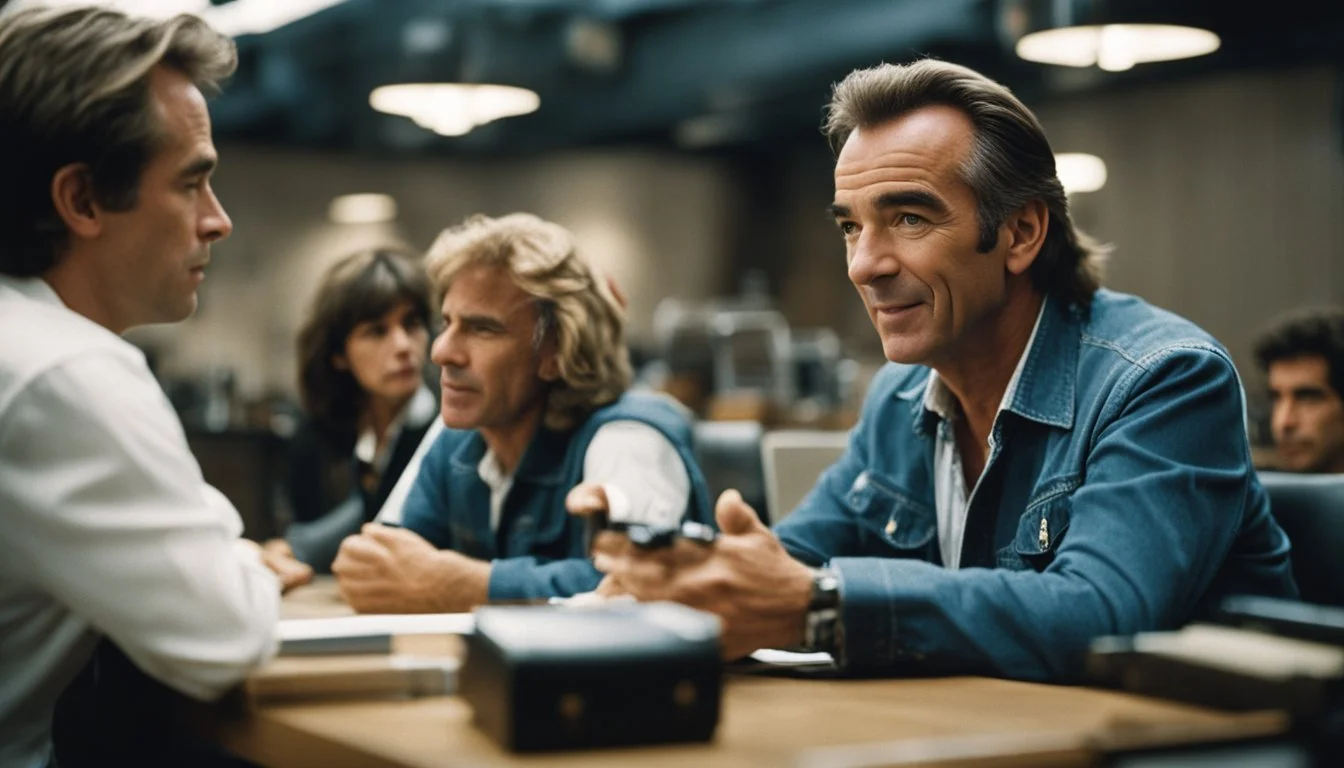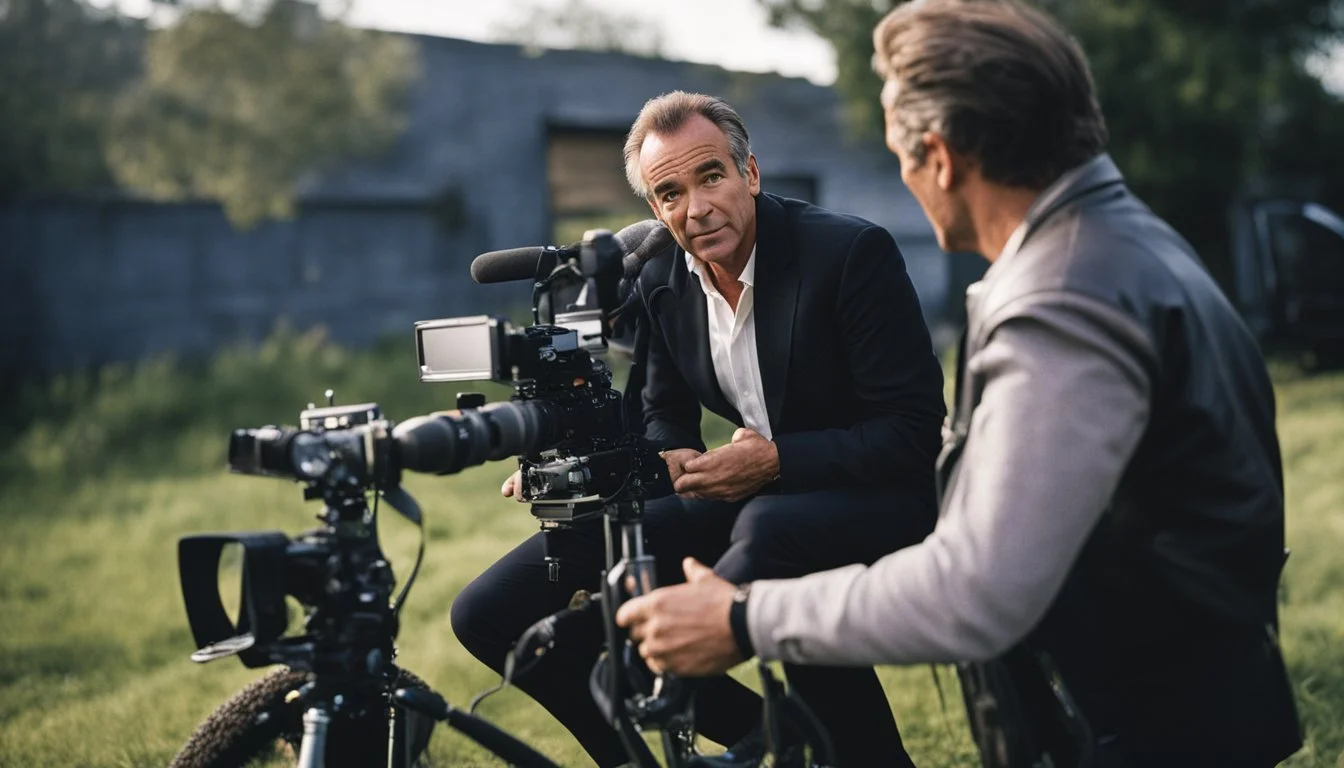Nick Broomfield Battles Powerful Forces to Complete Kurt and Courtney Documentary
Nick Broomfield's documentary "Kurt & Courtney" faced numerous obstacles on its path to completion and release. The film, which began as a study of Kurt Cobain's life and death, evolved into an exploration of censorship and fame.
Broomfield encountered significant resistance from Courtney Love, who attempted to block the film's production and distribution. This opposition transformed the documentary's focus, turning it into a commentary on the power dynamics within the music industry and the lengths some would go to control their public image.
The filmmaker's persistence in the face of legal threats and financial challenges highlighted the difficulties documentarians can face when tackling controversial subjects. Broomfield's encounters with Love, including a tense moment at a Valentine's Day party, added a personal dimension to the struggle. The film's eventual release in 1998, despite limited distribution, sparked discussions about artistic freedom and the boundaries of documentary filmmaking.
The Controversial Premise
Nick Broomfield's documentary "Kurt & Courtney" delved into the life and death of Nirvana frontman Kurt Cobain. The film explored his relationship with Courtney Love and examined various theories surrounding his untimely demise.
Exploring the Life and Death of Kurt Cobain
Kurt Cobain's rise to fame as the leader of Nirvana revolutionized the grunge music scene. His struggles with drug addiction and depression were well-documented. On April 8, 1994, Cobain was found dead in his Seattle home at the age of 27. The official cause of death was ruled as suicide by gunshot wound.
Broomfield's documentary aimed to provide a comprehensive look at Cobain's life, career, and the circumstances leading up to his death. The film featured interviews with friends, family members, and associates of the late musician.
The Influential Presence of Courtney Love
Courtney Love, Cobain's wife and lead singer of the band Hole, played a significant role in the documentary. Broomfield sought to explore her influence on Cobain's life and career. The film examined their tumultuous relationship and its impact on both their personal and professional lives.
Love's attempts to prevent the film's release added to its controversial nature. She reportedly threatened legal action and pressured potential distributors to avoid the documentary.
Addressing Conspiracy Theories
"Kurt & Courtney" tackled various conspiracy theories surrounding Cobain's death. Some speculated that his death was not a suicide but a murder. The film presented interviews with individuals who questioned the official narrative.
Broomfield investigated claims of foul play and explored alternative theories about Cobain's demise. This approach generated significant controversy and debate among viewers, critics, and those close to Cobain.
The documentary's willingness to address these theories contributed to its notoriety and sparked discussions about journalistic ethics in documentary filmmaking.
Nick Broomfield: The Documentary Filmmaker
Nick Broomfield is a renowned English documentary filmmaker known for his distinctive style and controversial subjects. His work often challenges powerful figures and institutions.
Filmography and Style
Broomfield's documentaries cover a wide range of topics, from true crime to celebrity culture. He employs a self-reflective approach, often appearing on camera and including the filmmaking process in his narratives.
His style combines investigative journalism with a personal touch. Broomfield frequently uses handheld cameras and conducts impromptu interviews, creating an intimate and immediate feel to his films.
Notable works include "Aileen Wuornos: The Selling of a Serial Killer" and "Heidi Fleiss: Hollywood Madam." These films showcase his ability to delve into complex and controversial subjects.
Previous Works and Credibility
Broomfield's credibility stems from his decades-long career and numerous award-winning documentaries. He has tackled subjects ranging from political figures to musicians.
His film "The Leader, His Driver and the Driver's Wife" examined South African white supremacist Eugene Terre'Blanche. This work demonstrated Broomfield's fearlessness in confronting dangerous subjects.
"Biggie & Tupac" explored the murders of two rap icons, showcasing his skill in navigating sensitive topics. These films established Broomfield as a filmmaker willing to ask tough questions and pursue uncomfortable truths.
Challenges Faced by Independent Journalism
As an independent filmmaker, Broomfield often faces significant challenges. Limited resources and access can make it difficult to compete with larger media organizations.
Legal threats and attempts at censorship are common obstacles. Powerful subjects may try to block the release of unflattering portrayals, as seen with "Kurt & Courtney."
Funding for controversial projects can be scarce. Broomfield has had to navigate complex relationships with distributors and financiers to bring his films to audiences.
Despite these hurdles, independent journalism remains crucial for exposing stories that mainstream media might overlook or avoid due to corporate interests or fear of repercussions.
Encountering Opposition and Censorship
Nick Broomfield faced significant obstacles while making "Kurt & Courtney." Legal threats, festival cancellations, and accusations of unethical journalism challenged the film's production and release.
Legal Hurdles and Court Actions
Courtney Love's lawyers sent cease-and-desist letters to Broomfield, threatening legal action if the film was released. They claimed the documentary contained defamatory content and unauthorized use of Nirvana's music.
Broomfield had to carefully navigate these legal minefields. He removed certain controversial segments and replaced Nirvana's songs with covers to avoid copyright issues.
The film's production company also received threats of lawsuits, adding pressure to halt the project.
The Role of Sundance Film Festival
The Sundance Film Festival initially accepted "Kurt & Courtney" for its 1998 lineup. However, just days before the screening, the festival abruptly canceled it.
Sundance cited unspecified legal concerns as the reason for pulling the film. Many speculated that pressure from Love's lawyers influenced this decision.
This cancellation dealt a significant blow to the film's prospects and raised questions about artistic freedom at major festivals.
The Impact on Freedom of Expression
The controversy surrounding "Kurt & Courtney" sparked debates about censorship in documentary filmmaking. Journalists and filmmakers rallied behind Broomfield, viewing the attempts to suppress the film as an attack on free speech.
Broomfield had to find alternative distribution methods. He eventually secured a limited theatrical release through an independent distributor.
The film's journey highlighted the challenges documentarians face when exploring controversial subjects, especially those involving powerful figures in the entertainment industry.
Production and Funding Challenges
Nick Broomfield faced numerous obstacles in financing and producing "Kurt & Courtney." The project encountered resistance from multiple angles, forcing the filmmaker to adapt his approach and seek alternative sources of support.
Securing Investment
Broomfield struggled to obtain traditional funding for "Kurt & Courtney." Major studios and broadcasters were hesitant to back the controversial project, fearing potential legal repercussions. The filmmaker turned to independent investors and smaller production companies to secure initial financing.
Broomfield also explored crowdfunding options, appealing directly to Nirvana fans and documentary enthusiasts. This grassroots approach helped generate buzz for the film and provided a modest budget to begin production.
Collaborative Efforts and Co-producers
To overcome financial limitations, Broomfield assembled a team of dedicated co-producers. Joan Churchill, a longtime collaborator, played a crucial role in shaping the film's visual style and helping to secure additional resources.
Tine Van Den Brande joined as a co-producer, leveraging her industry connections to arrange interviews and negotiate access to key locations. Alex Vendor contributed his expertise in music licensing, a critical aspect given the film's subject matter.
Navigating Financial Pressures
As production progressed, Broomfield faced mounting costs and budget constraints. The filmmaker made strategic decisions to cut expenses, including using a small crew and opting for guerrilla-style filming techniques.
Mark Atkins, the film's editor, worked closely with Broomfield to maximize available footage and create a compelling narrative within budgetary limitations. David Bergeaud composed an original score that enhanced the film's mood without incurring expensive music licensing fees.
Broomfield's resourcefulness and determination kept the project afloat despite ongoing financial pressures. He negotiated favorable rates with post-production facilities and explored alternative distribution channels to ensure the film's completion and release.
The Social Context of 'Kurt & Courtney'
The grunge movement, Nirvana's rise to fame, and the complex relationship between Kurt Cobain and Courtney Love shaped the cultural landscape surrounding Nick Broomfield's documentary.
The Grunge Movement and Nirvana's Impact
Nirvana emerged as the forerunners of the grunge movement in the early 1990s. Their raw sound and anti-establishment ethos resonated with disaffected youth across America.
Kurt Cobain's powerful lyrics and distinctive voice propelled Nirvana to global stardom. The band's breakthrough album "Nevermind" topped charts worldwide.
Grunge fashion - flannel shirts, ripped jeans, and combat boots - became a cultural phenomenon. Nirvana's success paved the way for other Seattle bands like Pearl Jam and Soundgarden.
The movement challenged mainstream rock and brought alternative music into the spotlight. Cobain's reluctant role as the "voice of a generation" added to the pressure he faced.
Public Perception of Kurt and Courtney
Kurt Cobain and Courtney Love's relationship was often portrayed as turbulent in the media. Their high-profile status made them constant targets for tabloid speculation.
Love, the lead singer of the band Hole, was often vilified by the press and Nirvana fans. Many viewed her as a negative influence on Cobain.
The couple's struggles with drug addiction were widely publicized. This fueled public concern about their ability to parent their daughter, Frances Bean.
Cobain's suicide in 1994 intensified scrutiny of their relationship. Conspiracy theories emerged, with some fans blaming Love for his death.
Influence of Celebrity and Fame
Fame had a profound impact on both Kurt Cobain and Courtney Love. Cobain struggled with the pressures of sudden stardom and media attention.
Love's own musical career was often overshadowed by her relationship with Cobain. She faced intense criticism and skepticism about her talents.
The couple's every move was documented and analyzed by the press. This invasive coverage contributed to Cobain's growing sense of isolation.
Celebrity status amplified the couple's personal struggles. Their battles with addiction and mental health issues became public spectacles.
The media frenzy surrounding their lives continued even after Cobain's death. This intense scrutiny formed the backdrop for Broomfield's controversial documentary.
Key Figures and Interviews
Nick Broomfield's documentary "Kurt & Courtney" features interviews with people close to Kurt Cobain and Courtney Love. These conversations provide varying perspectives on the couple's relationship and Cobain's death.
Family and Friends' Perspectives
Broomfield sought insights from Cobain's family members and friends in the Pacific Northwest. He interviewed individuals from Seattle and Portland who knew the couple personally. Some expressed concern about Cobain's drug use, particularly his heroin addiction. Others shared memories of Cobain's shy personality and his discomfort with fame. These interviews paint a complex picture of Cobain as a troubled artist struggling with the pressures of stardom.
Insights from Hank Harrison
Courtney Love's father, Hank Harrison, provided controversial statements for the film. Harrison made accusations about his daughter's involvement in Cobain's death. He claimed to have evidence supporting his theories. Broomfield included these explosive allegations in the documentary, despite their unverified nature. Harrison's interviews added a sensational element to the film, fueling conspiracy theories about Cobain's death.
Encounters with Music Peers
Broomfield spoke with musicians and industry figures who worked with Cobain and Love. These interviews offered glimpses into the couple's professional lives and their impact on the Seattle music scene. Some peers discussed Cobain's musical genius and his influence on grunge. Others shared stories about Love's ambitious personality and her rise from groupie to rock star. These conversations provided context for understanding Cobain and Love's relationship within the music world.
Reception and Legacy
Nick Broomfield's "Kurt & Courtney" sparked intense debate and left an indelible mark on documentary filmmaking. The film's controversial subject matter and unconventional approach garnered both praise and criticism from various quarters.
Critical Response and Viewer Opinions
Critics were divided on "Kurt & Courtney." Some lauded Broomfield's bold investigative style, praising his persistence in the face of obstacles. Others criticized the film's speculative nature and perceived lack of conclusive evidence. Viewers' reactions mirrored this split, with some finding the documentary compelling and others dismissing it as sensationalist gossip.
MTV initially agreed to air the film but later backed out, citing legal concerns. This decision further fueled public interest and discussion about the documentary's content.
The Lasting Influence on Documentary Genre
Broomfield's participatory approach in "Kurt & Courtney" significantly impacted documentary filmmaking. His on-screen presence and direct involvement in the narrative became a hallmark of his style, influencing future documentarians.
The film's exploration of fame, tragedy, and conspiracy theories set a precedent for documentaries delving into controversial subjects. It demonstrated the power of documentaries to challenge official narratives and spark public debate.
Cultural Impact and Ongoing Discussions
"Kurt & Courtney" reignited interest in Kurt Cobain's life and death, fueling ongoing discussions about celebrity culture and media scrutiny. The film's release through Roxie Releasing, after major distributors backed away, highlighted issues of censorship and corporate influence in media.
The documentary's dramatic portrayal of its subjects continued to generate buzz long after its release. It remains a touchstone for discussions about journalistic ethics, the boundaries of documentary filmmaking, and the public's fascination with rock star tragedies.






